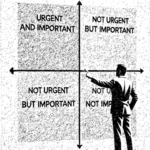
Eisenhower Matrix
4 October 2024
Stamp – does every entrepreneur have to use it?
9 October 2024Four-day work week
Introduction of a four-day work week: is this the future of the Polish labor market?
Discussions about the four-day workweek (4DWW) are becoming increasingly common in Europe, with some countries already starting to experiment with the solution. The idea of shortening the working week by one day may seem attractive to both employees and employers, but it brings with it a number of challenges and benefits that need to be well understood before implementing this model on a wider scale in Poland.
Benefits of a Four-Day Workweek
One of the main benefits of introducing 4DWW is improving work-life balance. Employees gain an extra day off, which can improve their well-being and increase their engagement in work. Studies show that reducing working hours can increase productivity. For example, New Zealand company Perpetual Guardian saw an increase in productivity and improved employee satisfaction after introducing a four-day workweek .
For employers, increased employee productivity it is potentially greater profits. Less tired and stressed employees can be more creative and focused on their duties. Fewer working days also means lower operating costs related to maintaining offices, energy consumption or equipment.
Challenges for entrepreneurs
However, the introduction of a four-day working week also brings challenges. Polish companies, especially those on a smaller scale, may find it difficult to implement this model without negatively impacting their business. In many industries, especially in manufacturing and services, a shortened workweek may require greater operational flexibility. For companies In high-intensity industries, such as logistics or customer service, a four-day work week can lead to additional costs associated with having to hire more workers for shorter shifts.
In addition, work culture in Poland can be a challenge. Compared to countries experimenting with 4DWW, Poland is more attached to traditional work models, where the amount of time spent in the office is still considered a measure of engagement and efficiency. Changing this mentality would require not only systemic changes, but also educational ones.
Potential effects of implementing a four-day workweek in Poland
Four-day work week: an opportunity for innovation or a challenge for Polish enterprises?
The introduction of a four-day work week could attract younger generations in the labor market, who expect more flexibility and a better work-life balance. In addition, companies offering modern work models could gain competitiveness in talent acquisition, especially in technology industries.
On the other hand, implementing such a model could lead to an increase payroll costs, If companies would decide to maintain full salaries while reducing working hours. For many companies, especially those operating in low-margin markets, such a solution could prove financially unprofitable.
Examples from other countries of the four-day workweek
The introduction of a four-day working week is already being tested in many countries, including Spain, Iceland and the United Kingdom. Experimental results in these countries are encouraging – both in terms of employee satisfaction and company performance. In Iceland, where large-scale tests were carried out in the public and private sectors, it was shown that reducing working hours did not negatively affect productivity .
Four-day work week
Is this the future of the Polish labor market?
Although the idea of a four-day work week seems attractive, its implementation in Poland may require thorough analysis and adaptation to the specifics of the domestic market. Not all industries and companies will be able to implement such a solution without additional costs or reorganization of work. However, with increasing pressure from employees for flexibility and changes in work patterns, entrepreneurs may be forced to consider this solution as part of a future strategy.
Sources:
Perpetual Guardian: "Perpetual Guardian's 4-Day Week Trial: Productivity Up, Stress Down" – available on the company's website.
Icelandic Four-Day Workweek Report: Results from research conducted between 2015 and 2019, available on the Icelandic Research Institute website.
Take advantage of our virtual office to gain a prestigious address and professional service without the high costs of maintaining a physical space. Click on the OFFER and discover how our solutions can facilitate the development of your company!





